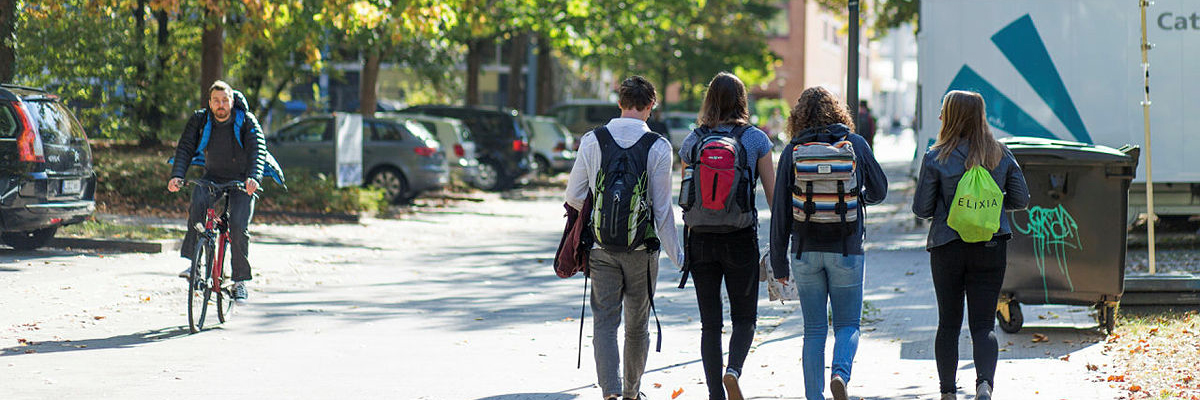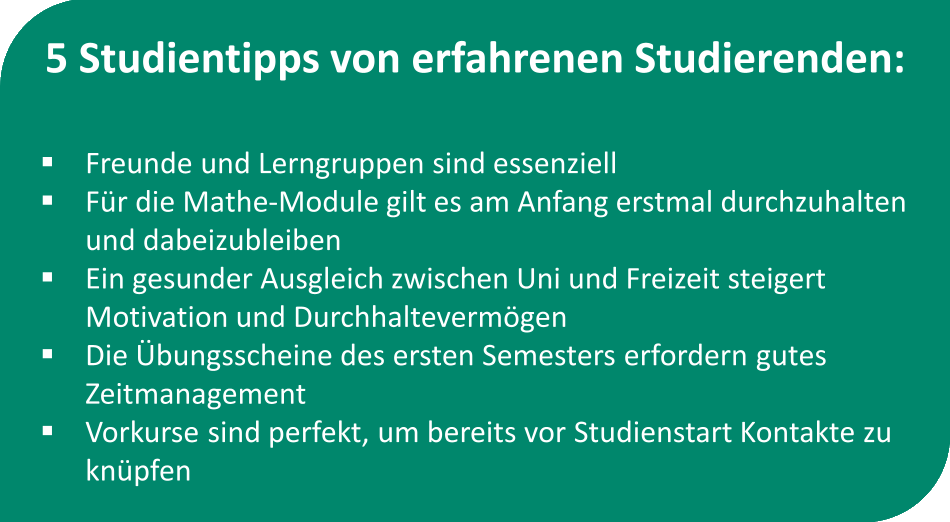Studying made easy
Have you just enrolled in an Informatics, Information Systems or Informatics Teacher Education program at KIT? Then you are at the right place! Welcome to the entry page of the KIT Department of Informatics. Our goal is to prepare you for the organizational ups and downs of your studies and to make you fit for the galaxy of computer science studies. To this end, we present some orientation offers and a few tips and courses that should make your start a little easier. Sounds good? Then grab your notepad and let's go!
For many students, when they start their studies, a completely new chapter in their lives begins. With the start of their studies, they will enter a completely new world, which differs in many aspects from school and previous experiences.
In order to prepare you for a smooth start to your studies, we have listed some tips and offers here. Below you will find important information about the first semester and offers before the actual start of the lecture, such as the orientation phase and the preparatory courses.
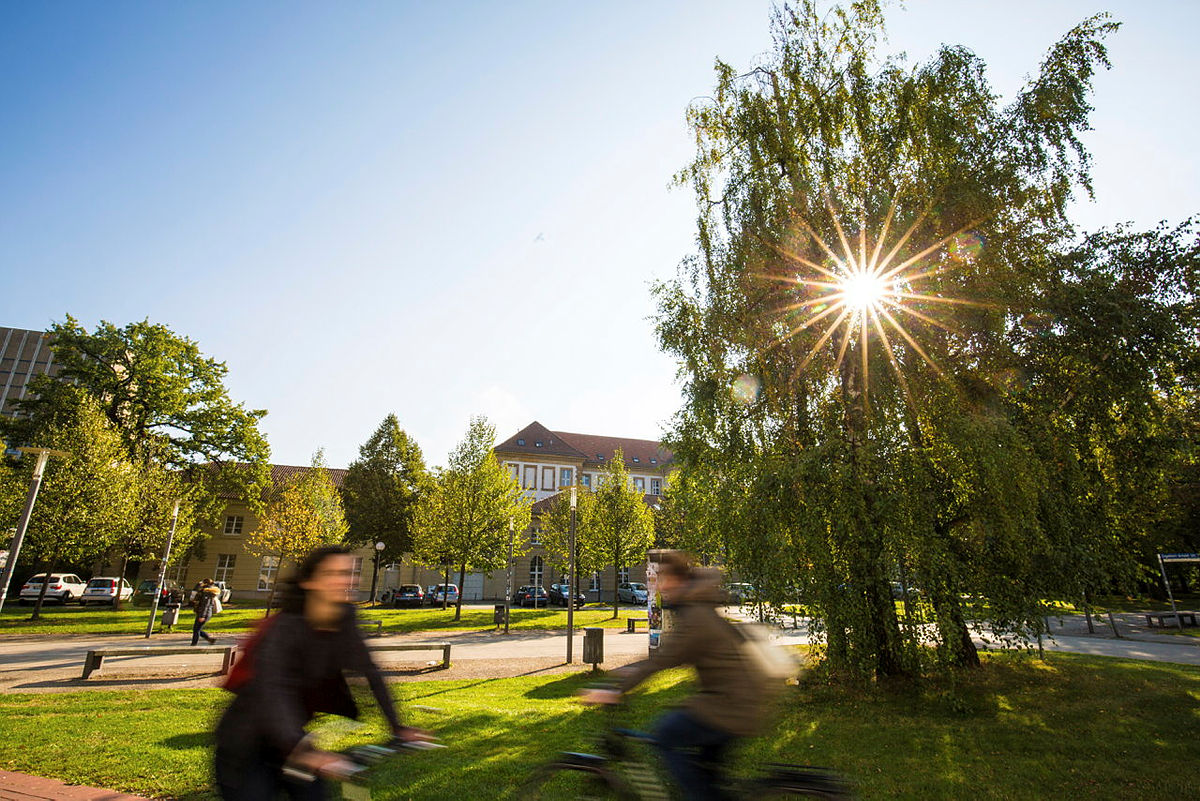
Further assistance for the study location Karlsruhe.
link
The first semesters of the course are generally firmly pre-structured. Therefore, at the beginning you attend the same lectures with almost all fellow students of the same study program.
In the first semesters, the foundations for further studies are laid. That means you are introduced to computer science or higher mathematics. This leads to a very theoretic start, which as a new student can come as a surprise. Especially the amount of math seems overwhelming in the first two semesters.
In the first semester, the scheduled workload for the math modules alone amounts to a total of 540 working hours, which corresponds to 36 hours of work per week. This is about 60% of the weekly workload, which is set at an average of 60 hours for each semester.
However, the proportional workload of the math modules already decreases to about 40% in the second semester. At least 22 hours of work per week must now still be expected for the math modules.
Also in the following semesters the effort of the math modules continues to decrease (below 15% as long as no more math is chosen). Accordingly, the math workload accumulates mainly at the beginning of the studies.
The programming module is also offered as a counterpart to the theoretical modules. This teaches the basic knowledge of the Java programming language.
The lectures include attending tutorials and working on exercise sheets, which experience has shown to be very time-consuming in the first semester.
In summary, in the first semesters you learn to fundamentally display a different way of working and thinking than, for example, a high school student, with whom you can successfully tackle complicated problems.
The MINT-Kolleg Baden-Württemberg offers preparatory courses both before the semester and supporting courses during the semester that are based on the lecture content.
The courses are well structured and are recommended by us to every new student before and during the semester.
Pre-study:
In the preparatory courses, knowledge from school is refreshed and, in some cases, an insight into the subjects of the course is given.
There are math preparatory courses (also an online course), programming preparatory courses and a math bridging course.
It is important to plan early for the preparatory courses, as they begin as early as September and thus require attendance in the weeks leading up to the start of the semester.
In study:
The MINT-Kolleg offers students at the KIT a variety of assistance during their studies. At the MINT-Kolleg KIT (Building 40.50), students can use the open learning room, get advice on subject content, or take advantage of the free supporting courses during the semester. The latter can make studying easier for every student and are therefore booked out very quickly. Accordingly, it is worthwhile to register early. In this context, these courses are not only considered helpful by the students, but even enable the extension of the examination period for the orientation examinations at the KIT Department of Informatics, if participation can be proven (see § 8 section 2 of the SPO).
"The math courses at the MINT-Kolleg helped me a lot because, in contrast to the lectures, you get applicable arithmetic methods and understandable explanations." (Mir haben die Mathekurse vom MINT-Kolleg sehr geholfen, weil man, im Gegensatz zu den Vorlesungen, anwendbare Rechenwege und verständliche Erklärungen kriegt.) – Informatics student at the KIT
What is the O-Phase?
- The orientation phase, or simply O-phase, is intended as an introduction to your studies. Here you will find all the important information about your studies and will be shown the campus by students from higher semesters.
- The participants can choose one of several O-phase groups in which they want to participate. The O-phase groups differ in their activities, so that there is a suitable group for everyone!
Why should I participate?
- The O-phase is the best place to get to know your new fellow students. The students you get to know here will usually accompany you through your entire study.
- There is always positive feedback, which describes the O-phase as essential as an introduction to the course and to find the future learning group.
- Presence is mandatory! (Just kidding, but it's worth being there!)
- There is a suitable group for everyone, so the fun is inevitable!
Do I have to register myself?
- For Informatics and Teacher Education (Informatik/Lehramt): No, you don't have to register. Just come to the announced lecture hall on the monday of the O-phase. You can read more information on the website of the Fachschaft and you will also receive a corresponding letter.
- For Information Systems (Wirtschaftsinformatik): The forum asks you to register in advance (https://erstsemester.forum-wi.de/).
Further information:
- For Informatics and Teacher Education (Informatik/Lehramt): https://o-phase.com/de/ws2021/
- For Information Systems (Wirtschaftsinformatik): https://erstsemester.forum-wi.de
Fachschaft Mathematik/Informatik (FSMI):
- The Fachschaft represents all students studying at the KIT Department of Informatics. It can be found in the basement of the Informatics building (Geb. 50.34, Raum -124).
- Website: https://www.fsmi.uni-karlsruhe.de/Fachschaft/
Forum Wirtschaftsinformatik (WI):
- The Forum WI is practically the personal Fachschaft for Information Systems at the KIT and is located in the collegiate building on the Kronenplatz (Geb. 05.20, Raum 3C-01).
- Website: https://www.forum-wi.de/
Offers of the Fachschaft:
The Fachschaft organizes the well-known O-phase and events, such as the owl-festival. It also offers online consultation hours, where you can get specific advice regarding your study or you can ask general questions about the Informatics / Information Systems course. An important part of the Fachschaft is also the sale of old exams and transcripts. Furthermore, the Fachschaft rents out the lockers in the Informatics building.
eezi - Eine Einführung zum Informatikstudium (T-INFO-109862)
The Module "eezi" (pronounced "easy") is a guide to navigating the KIT Department of Informatics' program of studies. It is aimed at and recommended to all first-semester bachelor students of Informatics, Information Systems and Informatics Teacher Education at KIT.
Overview of the eezi curriculum:
- 6 tutorials with compulsory participation
- 5 exercise sheets with compulsory submission
- 1 eezi consultation (compulsory)
- 1 check-in meeting with tutor
- 3 lectures
Course topics include: Time, self, study, stress management, study techniques, exam preparation, as well as tips and tricks "How to survive the first semester" and "What do I need to do to manage my studies". The focus is on helping students to help themselves in order to provide them with long-term strategies to successfully manage their studies. The check-in chat is designed to provide a one-on-one, eye-to-eye exchange between first-semester students with upper-semester students. The eezi-advising session serves to answer students' questions about their studies and to assess their study situation. This includes reflection and evaluation of their own progress, as well as discussion of possible problems and successes.
Successful completion of the module is credited with 1 ECTS as a key qualification for study progress.
Upcoming dates for informational events can be found in the events calendar.
Further information on the eezi module can be found in the module handbook.
The participants of eezi can expect interesting lectures on topics that can be helpful not only in Informatics but also in the general course of studies. Different topics, from time management to coping with stress, are covered. It is important to us that we respond precisely to the needs of the students so that questions are encouraged.
In the tutorials, we try to create a casual and relaxed atmosphere. It is therefore important to us not to be frontal teaching, but to interact with the students and to have frequent conversations and discussions. The main thing is that it doesn't get boring!
In addition, the tutor should be a contact person for personal problems that can be addressed outside or after the tutorial in a one-on-one conversation.
The eezi curriculum is divided into three lectures that are voluntary and six tutorials. The lectures are given by various KIT employees (including professors). The tutorials are led by students from higher semesters and are based on the material from the lecture, but supplement them with a lot of additional information. Hence, most of the material is taught in the tutorials.
Registration for the module takes place via the campus portal. Registration for the tutorials will take place here.
All materials used in the lectures, exercises and tutorials are made available via the eezi Ilias-course. This is also where the exercise sheets are distributed and collected. Each tutorial has its own Ilias course.
A tutor is a student from a higher semester who leads the tutorial and teaches the students the content of the module. In contrast to a teacher or professor, the tutor is closer to the student's experience, which promotes easier communication. In addition, the tutor serves as a mentor and contact person, who is the first point of contact for questions about the course or more personal problems, in order to support students individually. The tutor accompanies the students of the tutorial over the entire semester.
Best Practices for the module "Programmieren"
This information event is offered every semester with the aim of giving all students at the KIT Department of Informatics the best chances of success for the module Programmieren. This event is not only aimed at the first semester students of the faculty, but also at students who intend to successfully complete the module Programmieren in higher semesters.
For this purpose, a member of the tutorial team of the programming module will present so-called best practices for the course. These contain useful tricks for a goal-oriented way of working in this module and approaches to the technical as well as organizational tasks of the module. After these general suggestions, students have the opportunity to ask questions in a Q&A section to get answers and advice from the people present.
This will be followed by the Lernpartnerbörse, where students can be matched to learning groups and thus work together to overcome the challenges of the Programmieren module.
For the date of Programmieren Best Practices in the current semester, please see the calender for information events of the ISS.
Study partners as the key to study success
Study partners or even entire study groups contribute a great deal to personal success in studies. You can work on exercise sheets together, help each other with comprehension problems and motivate each other when the growing challenges threaten to overwhelm you. Therefore, it is essential to look for one or more study partners early in your studies and, in the best case, to keep them for further semesters. If you have difficulties finding such valuable learning partners, you can take a look at the ISS Lernpartnerbörse or the Mentoring support area.
The Lernpartnerbörse always takes place after the Programmieren Best Practices event and is open to any student of the Faculty of Informatics.
The team on Mentoring offers different services to promote social integration and to get help in finding study partners.

A detailed study plan is essential to start each semester well prepared.
link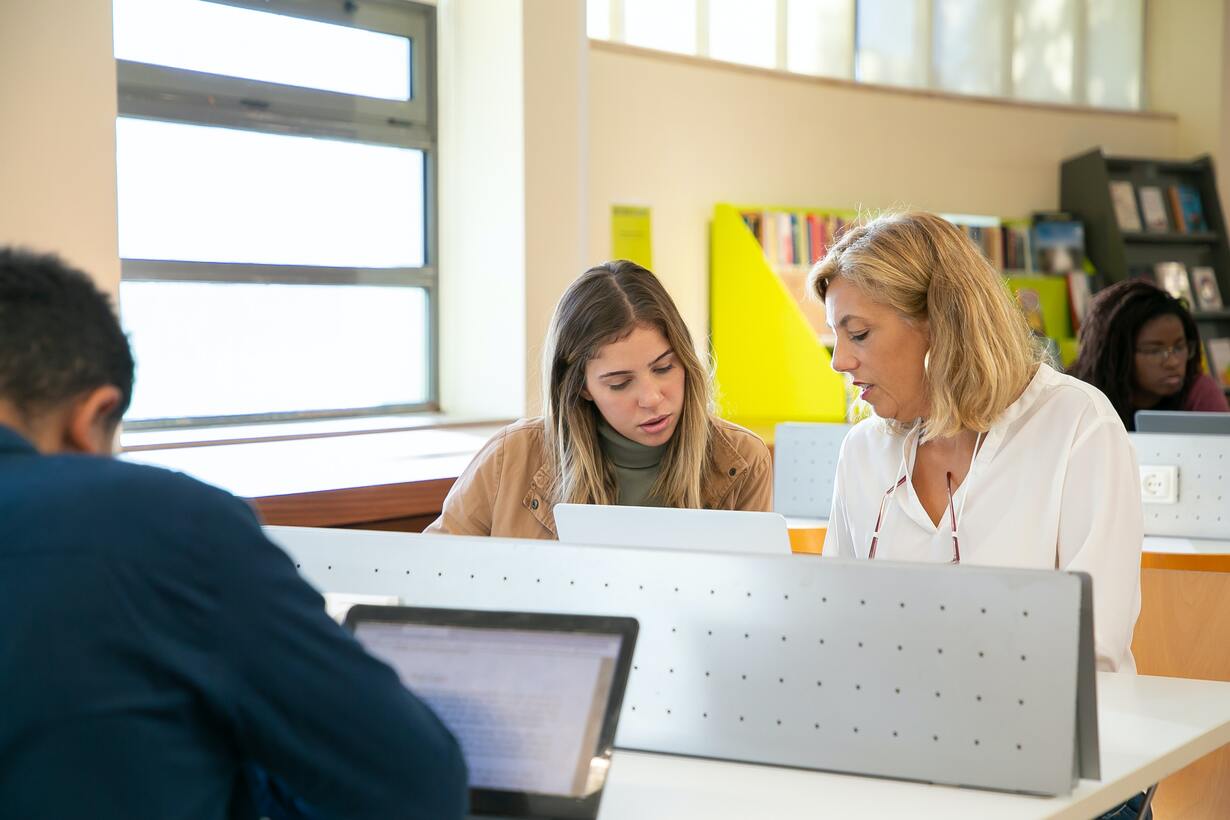
Detailed resources on counseling services and numerous points of contact.
link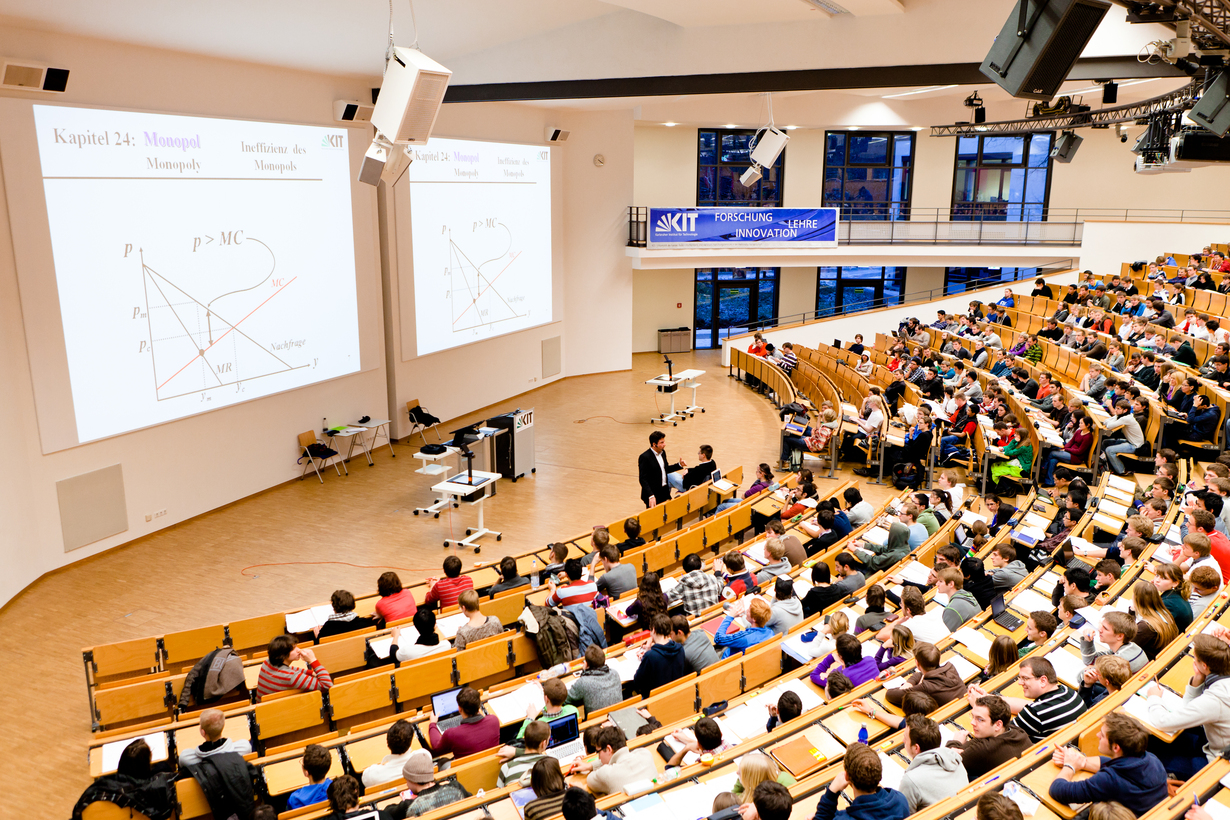
Haben Sie eine interessante Veranstaltung verpasst? In unserer YouTube-Playlist finden Sie die Aufzeichnungen der meisten Veranstaltungen.
link

